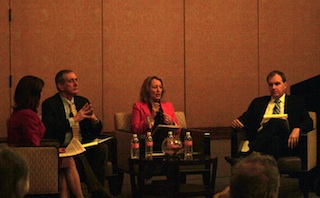Mayoral Candidate Forum



Elected leaders do not have the permanency that other community partners may have. Professors, directors of organizations, and government staff/civil servants may outlast the mayor, councilperson, or commissioner who serves a four- or eight-year term. In order to ensure that an age-friendly initiative is understood, valued, and integrated into the future leader’s political agenda, one strategy is hosting a forum where the top candidates discuss age-friendly topics, in public. This puts them “on the record” and it affords an opportunity to learn about their perspectives and potential approaches, if elected. Additionally, older adults can be directly involved in the forum to ask questions about issues that are real to them. In April, 2007, in Portland, Oregon, USA, the top three candidates were invited to speak about “building an age-friendly Portland.” The audience focused on issues of housing (e.g., affordability, accessibility), the need to have quality services (e.g., preventive care, access to fresh foods), etc. After the forum, one mayoral candidate started to use language in his campaign around age-friendly transportation. After the election was over, the elected mayor had made a commitment to age-friendly issues. Whether that person fulfills those promises, or not, they have put forth their views and comments that are recorded indefinitely. The community has the ability to remind them, or not vote for them for reelection if they do not fulfill the promises they made.
Main target group: Older people in general
Other target group(s): People with disabilities
Sector(s): Labor
Desired outcome for older people:
Contribute
Other Issues: Policy, services, and political responses to an aging population